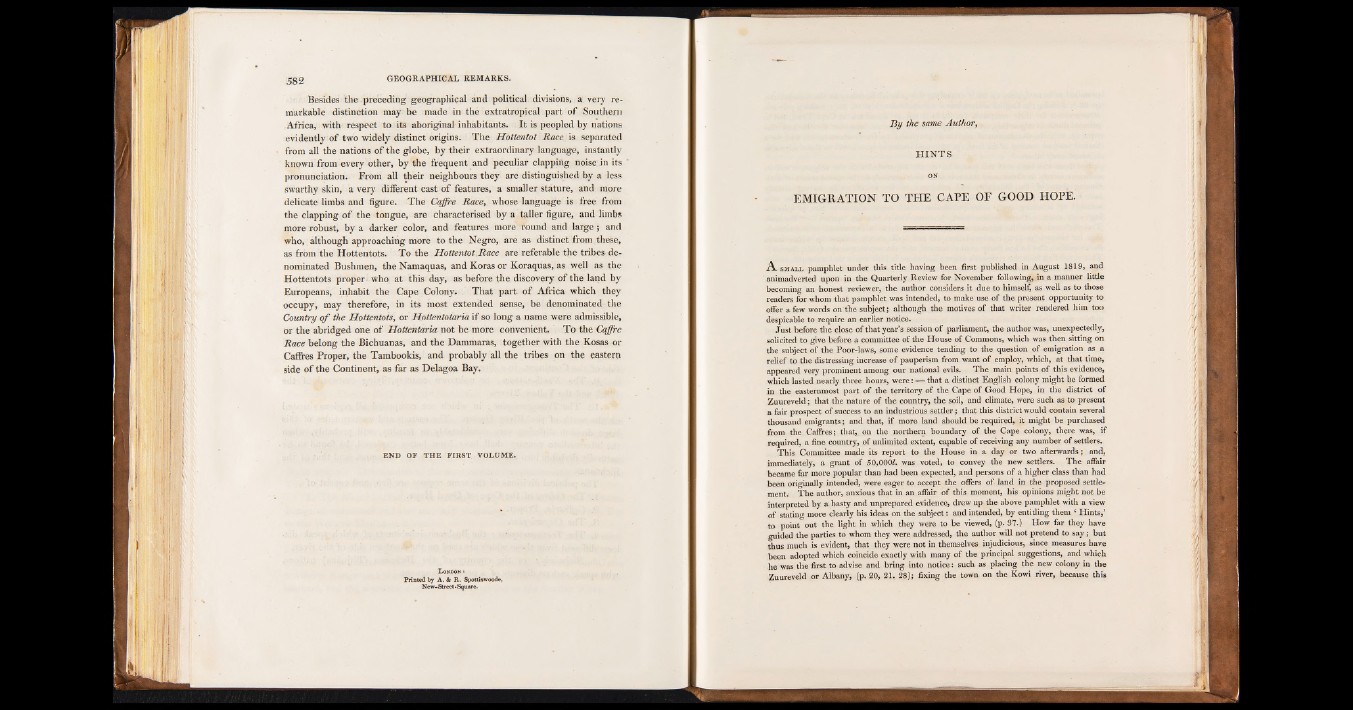
Besides the preceding geographical and political divisions, a very remarkable
distinction may be made in the extratropical part of Southern
Africa, with respect to its aboriginal inhabitants. It is peopled by nations
evidently of two widely distinct origins. The Hottentot Race is separated
from all the nations of the globe, by their extraordinary language, instantly
known from every other, by the frequent and peculiar clapping noise in its
pronunciation. From all their neighbours they are distinguished by a less
swarthy skin, a very different cast of features, a smaller stature, and more
delicate limbs and figure. The Cqffre Race, whose language is free from
the clapping of the tongue, are characterised by a taller figure, and limbs
more robust, by a darker color, and features more round and large; and
who, although approaching more to the Negro, are as distinct from these,
as from the Hottentots. To the Hottentot .Race are referable the tribes denominated
Bushmen, the Namaquas, and Koras or Koraquas, as well as the
Hottentots proper who at this day, as before the discovery of the land by
Europeans, inhabit the Cape Colony. . That part of Africa which they
occupy, may therefore, in its most extended sense, be denominated the
Country o f the Hottentots, or Hottentotaria if so long a name were admissible,
or the abridged one of Hottentaria not be more convenient. To the Cqffre
Race belong the Bichuanas, and the Dammaras, together with the Kosas or
Caffres Proper, the Tambookis, and probably all the tribes on the eastern
side of the Continent, as far as Delagoa Bay.
END OF THE FIRST VOLUME.
L ondon :
Printed by A. & R. Spottiswoode,
New. Street-Square.
H IN T S
O N
EMIGRATION TO THE CAPE OF GOOD HOPE.
A s m a l l pamphlet under this title having been f i r s t published in August 1 8 1 9 , and
animadverted upon in the Quarterly Review for November following, in a manner little
becoming an honest reviewer, the author considers it due to himself, as well as to those
readers for whom that pamphlet was intended, to make use of the present opportunity to
offer a few words on the subject; although the motives of that writer rendered him too
despicable to require an earlier notice.
Ju st before the close of that year’s session o f parliament, the author was, unexpectedly,
solicited to give before a committee of the House of Commons, which was then sitting on
the subject of the Poor-laws, some evidence tending to the question of emigration as a
relief to the distressing increase of pauperism from want of employ, which, at that time,
appeared very prominent among our national evils. The main points of this evidence,
which lasted nearly three hours, were: — that a distinct English colony might be formed
in the easternmost part of the territory of the Cape of Good Hope, in the district of
Zuureveld; that the nature of the country, the soil, and climate, were such as to present
a fair prospect of success to an industrious settler; that this district would contain several
thousand emigrants; and that, if more land should be required, it might be purchased
from the Caffres; that, on the northern boundary of the Cape colony, there was, if
required, a fine country, of unlimited extent, capable of receiving any number of settlers.
This Committee made its report to the House in a day or two afterwards; and,
immediately, a grant of 50,000Z. was voted, to convey the new settlers. The affair
became far more popular than had been expected, and persons of a higher class than had
been originally intended, were eager to accept the offers o f land in the proposed settlement.
Th e author, anxious that in an affair of this moment, his opinions might not be
interpreted by a hasty and unprepared evidence, drew up the above pamphlet with a view
of stating more clearly his ideas on the subject: and intended, by entitling them * Hints,’
to point out the light in which they were to be viewed, (p. 37.) How far they have
guided the parties to whom they were addressed, the author will not pretend to say ; but
thus much is evident, that they were not in themselves injudicious, since measures have
been adopted which coincide exactly with many of the principal suggestions, and which
he was the first to advise and bring into notice: such as placing the new colony in the
Zuureveld or Albany, (p. 2 0 , 2 1 . 2 8 ); fixing the town on the Kowi river, because this